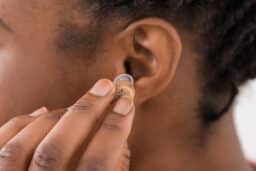Understanding Hidden Hearing Loss

We use pure tone testing to identify most cases of hearing loss. The results are charted on an audiogram to help us understand the degree and type of hearing loss. Hidden hearing loss, on the other hand, is a little trickier to diagnose. What is Hidden Hearing Loss? Hidden hearing loss describes any hearing loss…
Hearing Protection for Musicians and Concertgoers

Augusta has lots of incredible live music shows. Whether you’re a musician performing on stage or a concert attendee, protecting your hearing is crucial. Approximately 5% of the global population has noise-related hearing loss. Let’s take a look at a few important tips to help protect your hearing without sacrificing your favorite shows. 1. Wear…
A Practical Guide to How Everyday Noise Impacts Your Hearing

Noise is a constant part of life, whether it’s your morning coffee brewing or a concert you’ve waited months to attend. But not all sounds are created equal, especially when it comes to your hearing health. Understanding which sounds could put your ears at risk is the first step toward protecting them. Why Volume Matters…
How Does Sound Move Through My Ears?

Whether you’re enjoying a quiet conversation at Trellis Coffee Bar or tuning in to a podcast on your daily walk, your ears are constantly processing different sounds. Let’s take a closer look at how your hearing system works and why taking care of it matters. How the Hearing System Works Your hearing system is a…
Managing Tinnitus: How Hearing Aids Can Help You Find Relief

If you’ve ever experienced a ringing or buzzing sound in your ears, you’re not alone. Tinnitus affects between 15% and 20% of people. For some, it’s a temporary annoyance. But for others, it can be a daily challenge. The Impact of Chronic Tinnitus Tinnitus is considered chronic when it lasts for three months or longer….
How to Talk to Your Child About Hearing Loss and Deaf Awareness

Helping children understand hearing loss early on is a great way to promote empathy, inclusivity and communication. Maybe a classmate wears hearing aids, or your child recently saw someone using sign language at Brookfield Park. Whatever the spark, it’s a perfect opportunity to teach your child about hearing loss. Explaining Hearing Loss Children appreciate simple,…
What to Know About Ototoxicity

Certain medications and chemicals can cause a condition known as ototoxicity, which damages the inner ear. This damage can lead to hearing loss, ringing in the ears and balance issues, impacting your ability to enjoy conversations at local favorites like The Boll Weevil Café or events at the Augusta Riverwalk. While some medications have necessary…
Tips for Helping Your Hearing Aids Stay In Place

It’s understandable to feel annoyed if your hearing aids frequently fall out or become dislodged. This often happens because of poor fit, moisture and sweat or movement. Here are some tips and tricks to make sure your devices stay remain in your ears comfortably. Make Sure They’re In Properly It’s important to make sure you’re…
Causes and Treatment of Vertigo

It’s an odd sensation when you’re standing still, and the room feels like it’s moving. If this happens regularly, you may be experiencing vertigo. Vertigo is one of the most common causes of dizziness and is often the result of an issue with the inner ear. What Causes Vertigo When this condition is caused by…
Understanding the Emotional Impact of Tinnitus and How to Cope

Tinnitus, characterized by a persistent ringing or buzzing in the ears, affects millions of people each year. However, only a fraction of those impacted seek medical help. While tinnitus can occur at any age, its effects are not only physical but also emotional, sometimes leading to feelings of depression, anxiety, and in severe cases, suicidal…
